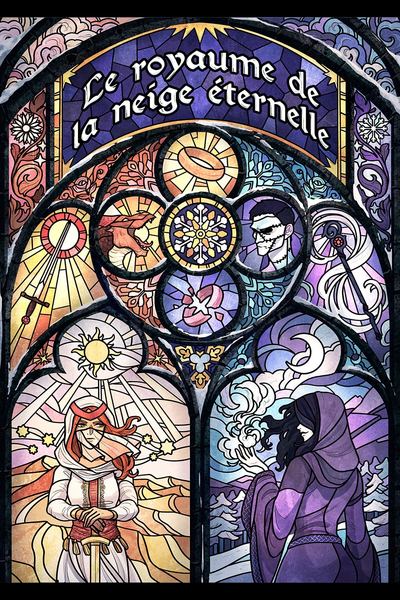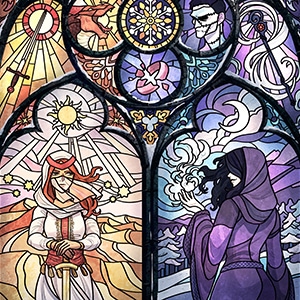Chapter 1
The Messenger of the Abyss
"The gods have stacked the cards
Hanging on the threads of their fingers
Trapped by the indefectible causality
We are playing with the loaded dice of fate".
- Orthée Hauar Valeden[1] (100 pre-ES). Timeless poems. Translated from Old Danean.
I. Where the fourth princess of Dana becomes High Priestess
Thalia Allan'ar Delmahni greeted the High Priest with a slow, graceful bow. The old man whose face was damaged by time took the damsel's hand with trembling emotion and brought it to his parched lips. He placed a kiss on the pattern of purity on her fingers, and a second on the pattern of piety of her palm. In accordance with tradition, Thalia knelt in the direction of the sun and held her quïra[2] to her lips, praying with her eyes closed as the High Priest recited the chants of the Divine Passing and solemnly conferred his title to her. At the last incantation, the girl gently bowed her head and allowed herself to be clothed in the red, white and gold veil befitting her new status. The Danean had closed her eyes as nahika[3]; when she opened them again to look at the faithful, it was as High Priestess. The worshipers rose from their prayer cushions, arms outstretched, faces streaming with tears of joy. The Passing was a once-in-a-lifetime event, and the ceremony lived up to their expectations. On the platform dedicated to the royal family, all of Thalia's relatives thanked the gods by offering them the salt water of their eyes.
The Passing completed, it was time for the new High Priestess to begin the morning prayer, the daasaq. Thalia checked the position of her headwear, smoothed the folds of her dress and then climbed the steps of the promontory, where she began to recite the psalms and prayers of the day. She declaimed the sacred texts with such fervour, her eyes shining with conviction, her heart vibrating with the sweet certainties of hope, that one could not doubt for a moment the purity of her faith. Her voice burned with divine passion; when she conveyed the grievances of her people to the creators, the followers could not help but be dazzled by the brilliance of her devotion. The High Priestess prayed for the gods to help the needy, to shield the warriors on the front line and to bring down their punishment on their enemies. She had the feeling, deep inside, that the sky was resonating with her and responding favourably. She had become the intermediary between the gods and humans.
Pride overcame her; she felt herself grow bold, but immediately repressed her exaltation shamefully. She belonged to the gods and to her people, and she should not take pride in that. Thalia closed her eyes again and finished the daasaq with a newfound serenity.
Finally, the crystalline sound of the catharsis[4] rang out and all rose enthusiastically to their feet after such an incredibly successful Passing and morning prayer. The gods could only be on their side after that! Never before had so many souls come to greet a High Priestess and ask her for a blessing. Thalia took on the task with controlled zeal. Gifts and congratulations poured in: "The gods speak through you, I can feel it!" "You are the jewel of the royal family and the pride of the people, High Priestess!" "You are the proud standard of our faith. Our armies will have every chance to win now. "
Thalia returned each praise graciously, letting the devotees taste the fruits of her superb upbringing. The morning went on for some time. After the last commoner had left, it was the turn of her family to come and greet her in person. They had observed her entire elevation as High Priestess, as was the tradition, and they did not regret a moment of it. Her sisters, especially, were the first to praise all her merits.
"You were magnificent, Thalia!" they cried. "You have become High Priestess of the Temple of Dana, do you realise the importance of such a rank? Now you are the representative of the most important temple of our great nation!"
"We are very proud of you," added her mother with emotion.
Her father – the king – sketched a faint smile, a rare appearance on his stern features. He approached her and put a hand on her shoulder, apparently in the throes of emotion.
"My daughter. You may join us at our table now. Unless you wish to pray again."
Thalia could not count the years without being able to share a meal with her family. Nevertheless, she decided to linger a while in the temple, which she was granted. When she was finally alone, for the first time since dawn, she decided to pay homage to the goddess Eva, her favourite deity. The High Priestess gently brushed the statue's feet, her mind wandering over the day's events. Her gaze suddenly caught her reflection in the side mirror used for self-confession, a difficult enough ordeal even for the most ascetic worshippers. There she saw a slender young girl of fine bearing, enhanced by her regal stance and her garments of ruddy and ivory velvet, embroidered with gold thread. Her sandy complexion, untouched by sun and the labors, highlighted the suqrenhdî[5] of her fine scholarly hands and the tawny volutes of her hair. Although ordinary in beauty, one unusual feature made her regular face memorable: the two silver pearls of her eyes, which shone with the curiosity and wonder of a child. The encounter with her reflection lasted only a second, during which time Thalia had time to think she was pretty - before immediately blushing with shame and lowering her gaze. She realised that it was to avoid developing vanity that the disciples of the temple were forbidden to look at themselves in a mirror outside of their duties. In an unconscious act of coquetry, she nevertheless fixed a few unruly chestnut locks of her hair. To purify herself of her forbidden gesture, she hurried to the altar, kissed the twelve rays of the quïra of the gods and implored forgiveness and guidance for her futility. Feeling that she had atoned for her sin, the girl then retired to her quarters with a carefree step.
[1] Danean names were composed of three parts: (1) the ego name (the customary one), of the same gender as that assigned to its bearer, (2) the alter ego name, of the opposite gender, and finally, (3) the hereditary name, transmitted from father to child or, in some ethnic groups, from mother to child. From this trinomial tradition, compound names followed by the family name have been retained.
[2] (dan.) Pendant in the shape of a sun with twelve rays, representing the twelve gods of Dana.
[3] (dan.) Priestess aspiring to the rank of High Priestess.
[4] Large bell of Danean style temples. As its name suggests, when it rings, believers are supposed to be purified of their evil passions.
[5] (wash., invariable) A term borrowed from washati meaning "blessing", these are traditional Danean body paintings. The often metallic coloured-patterns of these paintings had both an aesthetic and a symbolic function: they were supposed to bring virtues or benefits to their wearer. These paintings had to be renewed weekly, the day of suqrenhdî being holy and off duty.












Comments (0)
See all